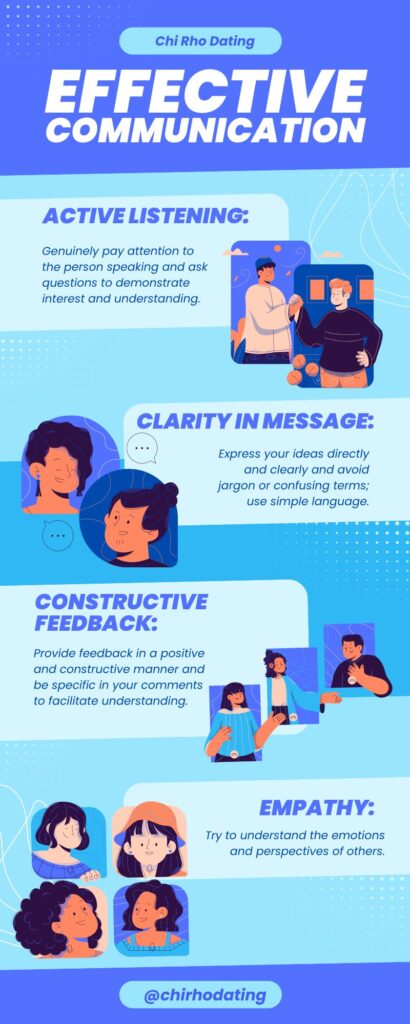We are a professional review company that receives compensation from companies whose products we review. We test each product thoroughly and give high marks only to the ones that are the very best. We are independently owned, and the opinions expressed here are our own.
Effective communication is the cornerstone of a healthy and fulfilling relationship. It enables partners to understand each other’s needs, resolve conflicts, and build a stronger bond. However, many couples struggle with communication issues that can lead to misunderstandings and emotional distance.
Take Emily and John, for example. They’ve been together for five years, and while deeply loving each other, they often find themselves in heated arguments over minor misunderstandings. Emily feels that John doesn’t listen to her, while John thinks Emily frequently misinterprets his intentions. These communication barriers create tension and frustration in their relationship.
This article will explore practical tips and techniques to help couples like Emily and John communicate more effectively. By understanding common barriers to communication and implementing strategies to overcome them, you can enhance your relationship and connect with your partner on a deeper level. Let’s dive into the fundamental principles and actionable steps to improve communication with your partner.
Understanding the Importance of Communication
Effective communication is the foundation upon which healthy relationships are built. It involves not just talking but truly understanding and connecting with your partner. For couples like Emily and John, improving their communication can transform their relationship from one filled with misunderstandings to one that is harmonious and fulfilling.
Definition of Effective Communication
Effective communication in a relationship means clearly expressing your thoughts, feelings, and needs while being receptive to your partner’s perspective. It’s a two-way street that requires both speaking and listening skills. Good communication helps partners navigate challenges, make decisions together, and deepen their emotional connection.
The Role of Communication in Relationships
Communication plays a crucial role in the following:
- Building Trust: Open and honest communication fosters trust, as partners feel safe sharing their thoughts and feelings without fear of judgment.
- Enhancing Intimacy: Sharing personal experiences, dreams, and concerns can deepen the emotional bond between partners, creating a more intimate relationship.
- Conflict Resolution: Effective communication helps resolve conflicts by ensuring both partners feel heard and understood, paving the way for constructive solutions.
- Supporting Each Other: Through good communication, partners can offer emotional support, validate each other’s feelings, and work as a team.
Benefits of Good Communication: Trust, Intimacy, Conflict Resolution
For Emily and John, improving their communication could bring several benefits:
- Trust: By practicing open communication, Emily can express her feelings without fearing that John will dismiss her concerns. Similarly, John can share his thoughts, knowing that Emily will listen and understand. This mutual trust strengthens their relationship.
- Intimacy: Sharing more about their lives, dreams, and daily experiences can bring Emily and John closer. Discussing personal topics builds a deeper emotional connection, making them feel more united as a couple.
- Conflict Resolution: When conflicts arise, effective communication ensures that Emily and John can express their points of view and work towards a solution together. Instead of arguing, they can discuss their differences calmly and find common ground.
Effective communication is essential for a healthy relationship. Improving communication can build a stronger, more trusting, and intimate bond with your partner.
In the following sections, we will explore common barriers to effective communication and how to overcome them, ensuring that you and your partner can connect on a deeper level, as Emily and John aim to do.

Common Barriers to Effective Communication
Even the most loving couples can face challenges when it comes to communication. Understanding and overcoming these barriers is essential for fostering a healthy relationship. Let’s explore some common barriers to effective communication, using Emily and John’s experiences as examples, and how they can be managed.
Barrier 1: Misunderstandings
Misunderstandings occur when partners misinterpret each other’s words or actions, leading to unnecessary conflicts. For Emily and John, this often happens when they assume each other’s intentions without clarifying.
Causes of Misunderstandings:
- Lack of Clarity: When messages are not expressed clearly, they can be easily misinterpreted.
- Assumptions: Assuming what the other person means or feels without asking for clarification.
- Differences in Communication Styles: Each person may have a unique way of expressing themselves, leading to miscommunication.
How to Recognize and Address Misunderstandings:
- Ask for Clarification: Instead of assuming, Emily could ask John to explain what he means. This ensures that she understands his perspective accurately.
- Paraphrasing: John could paraphrase what Emily says to confirm his understanding. For example, “So, what I hear you saying is…”
- Avoid Making Assumptions: Both partners should habitually seek clarity rather than jump to conclusions.
Barrier 2: Emotional Triggers
Emotional triggers are past experiences or issues that cause an intense emotional response. These can derail conversations and lead to arguments. Emily feels hurt when John dismisses her concerns because it reminds her of past relationships where she felt unheard of.
Identifying Emotional Triggers:
- Self-Awareness: Recognize your emotional triggers by reflecting on past experiences and understanding what causes a strong emotional reaction.
- Communication with Partner: Share these triggers with your partner so they are aware and can be more sensitive to them.
Managing Emotions During Conversations:
- Take a Break: If a conversation becomes too heated, Emily and John could take a short break to cool down before continuing.
- Use “I” Statements: Emily could express her feelings without blaming John. For instance, she could say, “I feel hurt when my concerns are dismissed,” rather than “You always ignore me.”
- Practice Self-Soothing Techniques: Techniques such as deep breathing, counting to ten, or visualization can help manage emotions during tough conversations.
Barrier 3: Differences in Communication Styles
Everyone has a unique way of communicating. While John might prefer direct and concise communication, Emily might lean towards a more expressive and detailed style. These differences can cause friction if not managed well.
Understanding Different Communication Styles:
- Assertive: Expressing thoughts and feelings clearly and respectfully.
- Passive: Avoid expressing thoughts and feelings directly.
- Aggressive: Expressing thoughts and feelings in a way that violates others’ rights.
- Passive-Aggressive: Indirectly expressing negative feelings instead of openly addressing them.
Adapting to Each Other’s Styles:
- Find a Middle Ground: Emily and John could work on balancing their styles, ensuring both feel heard and understood.
- Communicate Preferences: Discuss and understand each other’s preferred communication style and adjust accordingly.
- Be Patient and Flexible: Recognize that adapting to each other’s style takes time and effort. Be patient and willing to make changes.
References
For further reading on effective communication techniques and overcoming barriers, you can refer to these sources:
- Indeed – Overcoming Communication Barriers
- Indeed – What Are Common Barriers?
- Forbes – How to Improve Communication Skills
Couples like Emily and John can improve communication and strengthen their relationship by recognizing and addressing these shared barriers. The following sections will explore fundamental principles and practical tips for effective communication.

Key Principles of Effective Communication
Mastering the principles of effective communication is essential for building a solid and lasting relationship. These principles provide a framework to help couples like Emily and John communicate more clearly and effectively. Let’s explore these fundamental principles and how they can be applied in everyday interactions.
Principle 1: Active Listening
Active listening involves fully concentrating, understanding, responding, and remembering what is being said. It’s not just about hearing the words but also about understanding the underlying message.
Definition and Importance:
- Active listening ensures that both partners feel heard and valued.
- It helps prevent misunderstandings and fosters empathy.
Techniques for Active Listening:
- Maintain Eye Contact: This shows that you are engaged and paying attention.
- Nod and Use Affirmations: Simple gestures like nodding or saying “I see” can encourage the speaker to continue.
- Paraphrase and Reflect: Repeat what your partner has said in your own words to ensure understanding. For example, John might say, “So, you’re feeling frustrated because I didn’t listen to your concerns?”
- Avoid Interrupting: Let your partner finish their thoughts before responding. This ensures that they feel fully heard and understood.
Principle 2: Clear and Honest Expression
Expressing thoughts and feelings clearly and honestly is crucial for effective communication. It helps avoid misunderstandings and ensures that both partners are on the same page.
How to Articulate Thoughts and Feelings Clearly:
- Be Specific: Instead of general statements, provide specific examples. For instance, Emily could say, “I feel ignored when you look at your phone while I’m talking.”
- Use “I” Statements: This focuses on your feelings rather than blaming your partner. For example, “I feel upset when…” instead of “You always…”
- Be Honest: Share your true feelings and thoughts, even if they are difficult. Honesty builds trust and strengthens the relationship.
Importance of Honesty and Openness:
- Honest communication fosters trust and respect.
- It prevents resentment and builds a deeper emotional connection.
Principle 3: Empathy and Understanding
Empathy involves understanding and sharing your partner’s feelings. It’s about seeing things from their perspective and validating their emotions.
Practicing Empathy in Conversations:
- Put Yourself in Their Shoes: Try to understand your partner’s feelings and point of view. This will help you respond with compassion and understanding.
- Show Empathy Through Words: Use phrases like, “I can see why you feel that way” or “That sounds tough.”
- Validate Their Emotions: Acknowledge and accept your partner’s feelings without judgment. For example, John might say, “I understand that you’re feeling stressed about work, and I’m here to support you.”
Techniques to Show Understanding and Validation:
- Listen Without Judgment: Allow your partner to express themselves without interrupting or judging.
- Respond with Care: Offer supportive and understanding responses that show you value their feelings.
- Be Patient: Give your partner the time to express themselves fully.
References
For further reading on active listening, clear expression, and empathy, you can refer to these sources:
- Forbes – The Power of Listening
- Forbes – Active Listening Skills: What They Are and Why They’re Important
- Verywell Mind – How to Communicate Effectively
- Verywell Mind – 7 Active Listening Techniques for Better Communication
- Mind Tools – Active Listening
By embracing these critical principles of active listening, transparent and honest expression, and empathy, couples like Emily and John can significantly improve their communication. This leads to a more understanding, trusting, and emotionally connected relationship. In the next section, we will delve into practical tips for effective communication that can be easily incorporated into daily life.

Practical Tips for Effective Communication
Improving communication in your relationship involves adopting practical strategies that you can use every day. These tips will help couples like Emily and John enhance their interactions and strengthen their bond.
Tip 1: Set Aside Regular Time for Conversations
Regular communication helps prevent misunderstandings and ensures that both partners stay connected.
Importance of Regular Communication:
- It helps partners stay updated on each other’s lives.
- It prevents minor issues from escalating into more significant problems.
How to Schedule and Prioritize These Times:
- Weekly Check-Ins: Set aside a specific weekly time for a deep conversation. This could be over a meal or during a walk.
- Daily Touchpoints: Spend a few minutes each day catching up. This could be a morning coffee chat or an evening debrief.
- Date Nights: Regular date nights can also provide opportunities for meaningful conversations.
Tip 2: Use “I” Statements Instead of “You” Statements
“I” statements focus on your feelings and experiences, which reduces defensiveness and promotes constructive dialogue.
Examples of “I” Statements:
- Instead of saying, “You never listen to me,” try, “I feel unheard when I’m interrupted.”
- Rather than saying, “You always forget important dates,” say, “I feel hurt when special occasions are forgotten.”
Benefits of Using “I” Statements:
- Reduces blame and defensiveness.
- Encourages open and honest communication.
Tip 3: Avoid Interrupting and Stay Focused
Letting your partner speak without interruption shows respect and ensures that their thoughts and feelings are fully expressed.
Importance of Allowing Your Partner to Speak Without Interruption:
- Demonstrates respect and value for their opinions.
- Prevents misunderstandings by allowing complete thoughts to be expressed.
Techniques to Stay Focused During Conversations:
- Active Listening: Use active listening techniques, such as nodding and paraphrasing, to show engagement.
- Eliminate Distractions: Put away devices and other distractions to focus solely on your partner.
- Patience: Practice patience by giving your partner the time they need to express themselves.
Tip 4: Address Issues Promptly and Constructively
Addressing issues as they arise prevents them from poisoning and becoming more significant problems.
How to Address Issues as They Arise:
- Choose the Right Time: Find a time when both partners are calm and not distracted.
- Be Specific: Clearly state the issue without bringing up past grievances.
- Stay Calm: Approach the conversation with a calm and constructive mindset.
Constructive Ways to Bring Up and Discuss Problems:
- Use “I” Statements: Express your feelings and needs without blaming your partner.
- Focus on Solutions: Rather than dwelling on the problem, work together to find a solution.
- Be Willing to Compromise: Understand that compromise is often necessary to resolve conflicts.
Tip 5: Use Non-Verbal Communication Effectively
Non-verbal cues play a significant role in communication. Positive body language can enhance understanding and connection.
Role of Body Language, Facial Expressions, and Tone:
- Body Language: Open and relaxed body language shows you are approachable and engaged.
- Facial Expressions: Smiling and maintaining eye contact convey warmth and interest.
- Your Tone of Voice: A calm and friendly tone promotes a positive atmosphere for conversation.
Tips for Positive Non-Verbal Communication:
- Maintain Eye Contact: This shows that you are focused and interested in what your partner is saying.
- Smile and Nod: These simple gestures can encourage your partner to continue sharing.
- Avoid Crossing Arms: Open body language indicates you are receptive and open to the conversation.
References
For further reading on practical tips for effective communication, you can refer to these sources:
- Positive Psychology – 7 Ways to Improve Communication in Relationships
- Verywell Mind – Effective Communication Tips
- Chi Rho Dating – Signs of a Healthy Relationship and How to Cultivate Them
By incorporating these practical tips into your daily interactions, you can improve communication with your partner. This leads to a more understanding, respectful, and emotionally connected relationship. In the next section, we will further explore specific techniques for improving communication.

Techniques for Improving Communication
Implementing specific techniques can further enhance your communication skills and strengthen your relationship. These methods provide practical approaches to ensure that conversations are productive and positive.
Technique 1: Reflective Listening
Reflective listening involves understanding what your partner is saying and reflecting it to them. This shows that you are actively engaged and value their perspective.
How to Practice Reflective Listening:
- Listen Actively: Pay full attention to your partner without planning your response while they are speaking.
- Reflect: Paraphrase what your partner has said to confirm your understanding. For example, John might say, “It sounds like you’re feeling stressed because of work, is that right?”
- Ask for Clarification: Ask your partner to elaborate if something is unclear. This ensures you fully understand their point of view.
Benefits of Reflective Listening:
- Confirms understanding and prevents misunderstandings.
- Show empathy and validate your partner’s feelings.
- Encourages more profound and more meaningful conversations.
Technique 2: The Pause Technique
The pause technique involves taking a moment before responding to your partner. This allows you to process what has been said and respond thoughtfully rather than impulsively.
Explanation and Benefits of Pausing Before Responding:
- Gives Time to Think: Pausing helps you formulate a more considered and respectful response.
- Reduces Emotional Reactions: It helps manage emotions, preventing impulsive or heated replies.
- Shows Consideration: Pausing demonstrates that you take your partner’s words seriously and consider your response carefully.
How to Implement the Pause Technique:
- Take a Deep Breath: Take a deep breath to calm yourself before responding.
- Count to Three: Use this brief pause to collect your thoughts.
- Respond Thoughtfully: Respond to your partner’s points and expresses your perspective clearly.
Technique 3: Constructive Feedback
Constructive feedback involves giving and receiving feedback in a helpful and supportive way. It’s about addressing issues without causing defensiveness or hurt feelings.
How to Give and Receive Feedback:
- Be Specific: Focus on specific behaviors rather than general traits. For example, “I noticed that you didn’t call when you were late” instead of “You’re always inconsiderate.”
- Stay Positive: Frame your feedback positively. For instance, “I appreciate it when you let me know if you’ll be late” highlights the desired behavior.
- Be Receptive: When receiving feedback, listen without interrupting and thank your partner for their honesty. Reflect on their feedback and consider how you can improve.
Techniques for Making Feedback Constructive and Positive:
- Use “I” Statements: Express your feelings and needs without blaming. For example, “I feel worried when I don’t hear from you.”
- Focus on Solutions: Work together to find a solution after discussing the issue. This promotes collaboration and shows that you value each other’s input.
- Follow-up: Check in with each other to see if the changes are working and if further adjustments are needed.
References
For further reading on reflective listening, the pause technique, and constructive feedback, you can refer to these sources:
- Indeed – How to Practice Reflective Listening with Tips
- Mindful – The Power of Pausing
- Mind Tools – Giving and Receiving Feedback
By integrating these techniques into your communication practices, you can significantly enhance the quality of your interactions with your partner. Reflective listening, the pause technique, and constructive feedback are powerful tools that promote understanding, reduce conflicts, and strengthen your relationship.
In the next section, we will explore tools and resources that can further support your journey to better communication.

Tools and Resources for Better Communication
Consider utilizing various tools and resources to improve your communication skills further and enhance your relationship. These can provide additional guidance, support, and techniques to help you and your partner communicate more effectively.
Resource 1: Books and Articles
Books and articles on communication can offer in-depth insights, practical advice, and research-backed strategies. Here are some recommended reads:
- “The Five Love Languages” by Gary Chapman: This book explores how understanding and speaking your partner’s love language can improve communication and strengthen your relationship.
- “Nonviolent Communication: A Language of Life” by Marshall B. Rosenberg provides effective and compassionate communication techniques, focusing on empathy and understanding.
- Psychology Today—Articles on Communication: Psychology Today offers various articles on improving communication skills in relationships.
Resource 2: Workshops and Courses
Attending workshops and courses can provide hands-on experience and personalized feedback to help you and your partner enhance your communication skills.
- Gottman Institute Workshops: The Gottman Institute offers workshops and retreats for couples focusing on building solid relationships through effective communication. Gottman Institute
- Couples Communication Workshops: Many local community centers and therapy practices offer workshops to improve couples’ communication skills.
- Online Courses: Websites like Udemy and Coursera offer online courses on communication skills that you can take at your own pace. Udemy – Communication Skills
Resource 3: Professional Help
Sometimes, seeking professional help can provide the tailored support you need to overcome specific communication challenges.
Benefits of Couples Therapy:
- Personalized Guidance: A therapist can offer customized strategies based on your unique relationship dynamics.
- Safe Space: Therapy provides a secure and neutral environment to discuss issues and practice new communication techniques.
- Ongoing Support: Regular therapy sessions offer continuing support and accountability.
How to Find a Qualified Therapist:
- Referrals: Ask friends, family, or your primary care provider for recommendations.
- Online Directories: Websites like Psychology Today offer directories of licensed therapists. Better Help – Find a Therapist
- Local Resources: Check local community centers or health clinics for therapy services.
References
For further exploration of tools and resources, visit:
- Verywell Mind – Communication Skills
- Gottman Institute – Couples Workshops
- Marriage – 10 Effective Communication Skills
- Tony Robbins – How to communicate in a relationship
- Chi Rho Dating – How to Win His Heart: Proven Strategies for a Lasting Connection
By leveraging these tools and resources, you and your partner can continue to develop and refine your communication skills. Whether through books, workshops, or professional help, these resources provide valuable support to help you build a stronger, more connected relationship.

6 Ways to Improve Communication in Relationships
Effective communication is the cornerstone of any strong relationship. Understanding the importance of communication, recognizing common barriers, and adopting fundamental principles and practical tips can significantly enhance your interactions with your partner. Couples like Emily and John, who try to improve communication, can overcome misunderstandings, build trust, and deepen their connection.
Recap of Key Points Discussed:
- Understanding the Importance of Communication: Effective communication builds trust and intimacy and aids in conflict resolution.
- Common Barriers to Effective Communication: Misunderstandings, emotional triggers, and differences in communication styles can hinder communication.
- Key Principles of Effective Communication: Active listening, transparent and honest expression, and empathy are essential for meaningful conversations.
- Practical Tips for Effective Communication: Regularly setting aside time for conversations, using “I” statements, avoiding interruptions, addressing issues promptly, and using non-verbal communication effectively can improve your communication.
- Techniques for Improving Communication: Reflective listening, the pause technique, and giving constructive feedback enhance communication quality.
- Tools and Resources for Better Communication: Books, workshops, online courses, and professional help can provide additional guidance and support.
Encouragement
Improving communication with your partner is an ongoing journey that requires dedication, patience, and practice. It’s essential to be patient with yourself and your partner as you work towards better communication. Remember that every small step you take towards improving your communication skills can significantly impact your relationship.
Call to Action
Take the first step today by trying some tips and techniques discussed in this article. Whether setting aside time for regular conversations, practicing active listening, or attending a workshop, each effort brings you closer to a healthier and more fulfilling relationship.
Please share your experiences and tell us what strategies work best for you. Explore the resources provided for tips and insights on improving your relationship.
You may also want to watch the recommended video at the end of this article. It is free to watch.
Additional Resources
Explore more articles on communication and relationship tips to continue building a solid and lasting bond with your partner:
- Chi Rho Dating – Signs of a Healthy Relationship and How to Cultivate Them
- Verywell Mind – Healthy Communication Tips
- Forbes – How to Communicate Healthy in a Relationship
If you want to watch a video, since we’ve covered a lot of information in this video, click and watch the one below. It will discuss a strategy that has helped many couples open up and improve their communication.

Watching the video is free, but if you purchase the featured product, you should know that a small amount of the price you will pay will get back to us as a commission. However, we always recommend products we genuinely believe can improve your relationship, regardless of whether we earn something.
By embracing these strategies and seeking additional resources, you can transform your communication habits and foster a more supportive, understanding, and loving relationship.
To your success,




What do you think about the article you've just read? Please tell me below.